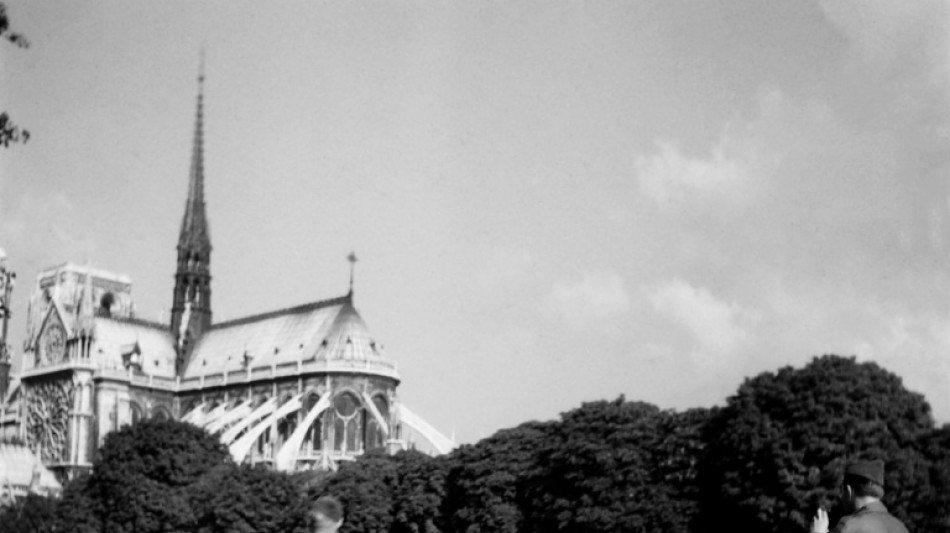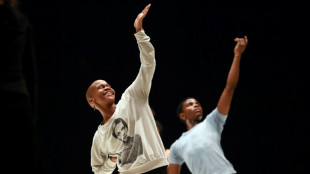

Notre Dame inspired Americans' love and help after fire
Through an avalanche of giving in amounts from $10 to $10 million, Americans have proved their love for Paris's Notre Dame cathedral, mobilizing to support the rebirth of a monument they hold dear.
"After the French, the Americans have been the biggest donors by far," Michel Picaud, president of the Friends of Notre-Dame de Paris, told AFP, ahead of the cathedral's reopening next month.
Founded in 2017, the group saw donations soar two years later, following the devastating fire that tore through the cathedral on April 15, 2019.
To date, the organization, headquartered in the northeastern US state of New Hampshire, has raised a total of $57 million from 45,000 donors, with Americans leading the way.
The top donations included $10 million each from the Starr Foundation, one of the largest American foundations, and the Marie-Josee and Henry Kravis Foundation.
When one adds donations made to other Notre Dame-supporting groups, including New York's French Heritage Society -- which received a $2 million check from the family of cosmetics icon Estee Lauder -- Picaud estimates that Americans have contributed $62 million for the restoration fund.
Built more than 600 years before the Eiffel Tower, the cathedral on Paris's Ile de la Cite is "one of the world's great treasures," as former US president Barack Obama, who visited in June 2009 with his wife and daughters, said on Twitter.
Obama was, of course, one in a long line of American presidents to visit the cathedral. Future president Thomas Jefferson visited in the 1780s while serving as ambassador to France.
- Medieval art -
Though the United States is a relatively young nation, its museums are full of medieval masterpieces. The Metropolitan Museum of Art even reassembled cloisters from four French abbeys on a Manhattan hill now known as The Cloisters.
"For Americans, Notre Dame of Paris is a physical symbol of a premodern European history that does not exist on American soil; as a potent 'lieu de memoire,' it evokes an imagined nostalgia for a rich and complex culture of the past," Meredith Cohen, a professor of medieval art and architecture at the University of California, Los Angeles (UCLA), told AFP.
"Americans also love Victor Hugo, who made Notre Dame famous through his books and writings on it, as well as in his vivid description of Revolutionary Paris in 'Les Miserables,'" which was hugely successful on Broadway and film versions, she added.
References to the cathedral run deep through American culture, from the first black-and-white films to recent animations.
- Quasimodo superstar -
Hugo's 1831 novel "The Hunchback of Notre Dame" was adapted to the big screen in 1923, becoming a silent-film classic. Other versions followed, notably a 1956 film that had Anthony Quinn playing Quasimodo and Disney's 1996 animation.
The cathedral also appears in numerous Hollywood full-length films, including Vincent Minnelli's "An American in Paris" with Gene Kelly; Stanley Donen's "Charade" starring Cary Grant and Audrey Hepburn; the Woody Allen film "Midnight in Paris" featuring Owen Wilson, Adrien Brody, Carla Bruni and Marion Cotillard; and even popular Pixar animation "Ratatouille."
For professor Michael Davis, a specialist in French Gothic art, "First and foremost, its facade offers an instantly recognizable image, not only of the cathedral itself, but one that evokes the city of Paris, the nation of France, the Middle Ages, the Catholic faith."
- A deep affinity -
The ferocious fire that tore through the cathedral five years ago sparked a worldwide wave of shock and concern. Major TV networks interrupted their programming and sent their star reporters to Paris.
As the flames were devouring the structure's wooden framework, then-president Donald Trump became so alarmed that he suggested to French authorities in a tweet that they should consider deploying "flying water tankers" like those used to fight wildfires. The French Civil Security agency said that was a bad idea.
The emotions were shared by many Americans.
"If the millions of visitors to Paris and France have seen one Gothic cathedral, it is probably Notre Dame, and the fire of April 15, 2019, no doubt activated the memory of that encounter and the bond to the cathedral," said Davis, a board member of the Friends of Notre-Dame de Paris.
Former World Bank managing director Bertrand Badre, another board member, paid tribute to the "generous and immediate" response of American donors.
"They spoke from their hearts, and we received some very touching testimonies," he told AFP.
UCLA's Cohen agreed.
"Americans generally have a great affinity for Paris and France's extensive culture... for its philosophers, artists and fashion houses, as well as the food and wine culture made famous in America by Julia Child," she said.
"All of this gets attached to Notre Dame."
K.Claymore--IP




